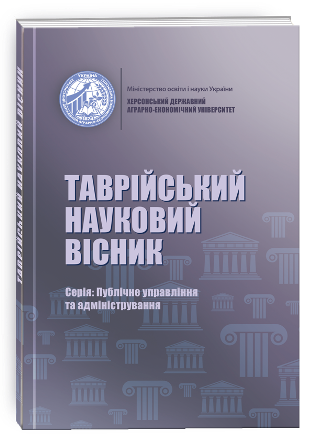THE ESTABLISHMENT OF THE INSTITUTE OF MILITARY CHAPLAINTY AS AN ADMINISTRATIVE INTERACTION OF THE STATE – ARMY – CHURCH
DOI:
https://doi.org/10.32782/tnv-pub.2024.2.3Keywords:
chaplain, army, church, state, law, management, initiative processAbstract
The current Russian-Ukrainian war not only consolidated the Ukrainian society in the confrontation with the enemy, but it also highlighted the priorities of social institutions, putting forward the Army and the Church. Today, the word "chaplain" has rapidly entered the everyday lexicon of Ukrainians. After all, when the war started, there were no psychologists on the front lines, the volunteer movement was just forming, but the priests in camouflage uniforms did stand together with soldiers. They combined the functions of volunteers, psychologists, and pastors. Based on the collected materials, the article reveals new aspects of the pastoral mission in today’s Ukrainian army. Thus, having studied the history of the institute of military chaplains in detail, we proposed our approach to its periodization, which is based on the processes that were alternately initiated by the church and the state. The process of establishing the Institute of Chaplains took thirty years. It was completed in November 2021, when the Verkhovna Rada of Ukraine adopted the Law "On the Service of Military Chaplaincy", which opened a new page for pastoral ministry and the Armed Forces. The article emphasizes that the army chaplains act as trained organizers of the spiritual life of military units; they implement the highly humanistic mission of religion to spread and affirm universal values. Today, in conditions of war, chaplains appear as heroes of the time; they make a special category of war participants who not only testify to the events on the front line firsthand but also support the servicemen spiritually and morally, providing them with practical psychological, social and volunteer training assistance. Chaplains are also important to help at the stage of temporary or permanent demobilization, they spend great efforts in the rehabilitation of soldiers and their families. Thus, the study and analysis of the peculiarities of pastoral care provide an opportunity to use the accumulated experience in modern conditions; the study contributes to the establishment of management and cooperation relations between the church and the state and allows to actualization the spiritual and moral components of the social development of society.
References
Владиченко Л. Досвід впровадження військового капеланства у Збройні сили України. URL: https://risu.ua/dosvid-vprovadzhennya-viyskovogo-kapelanstvau-zbroyni-sili-ukrajini_n81624 (дата звертання: 08.01.2024).
Зелінський А. О. Моя мандрівка у Країну морпіхів. Із щоденника капелана. Львів: «Видавництво Старого Лева». 2021. 228с.
Ващук М. Теоретико-правові аспекти утвердження інституту капеланства: до постановки проблеми. Гуманітарний корпус: збірник наукових статей з актуальних проблем філософії, культурології, психології, педагогіки та історії. Київ: НПУ імені М. П. Драгоманова, 2017. Вип. 14. Т. 2. С. 5–8.
Гоголь В., Делятинський Р. Історія становлення військового капеланства в Збройних Силах України (1991 – 2022 роки). Вісник Львівського університету. Серія філософсько-політологічні студії. 2022. Випуск 42, C. 26–38.
Підлісний А. Про створення організації служби капеланів у Збройних Силах України. Військово-науковий вісник: Академія сухопутних військ імені гетьмана Петра Сагайдачного, 2015. Вип. 23. С. 183–191. URL: http://nbuv.gov.ua/UJRN/vnv_2015_23_15 (дата звертання: 08.01.2024).
Коханчук Р. Роль капеланства у процесі відродження Збройних сил України на початку 90-х років минулого століття / Руслан Коханчук / / Військо України, 2011. № 8 (134). С. 20–22.
Закон України Про свободу совісті та релігійні організації. URL: https://zakon.rada.gov.ua/laws/show/1915-20#Text (дата звертання: 03.01.2024).
Коханчук Р. Історія (2004) // Департамент військового капеланства Патріаршої курії УГКЦ. URL: http://kapelanstvo.ugcc.ua/istoriya/ (дата звертання: 07.01.2024).
Указ Президента України Про Концепцію гуманітарного і соціального розвитку у Збройних Силах України від 12 січня 2004 року N 28/2004. Київ. URL: https://zakon.rada.gov.ua/laws/show/28/2004#Text (дата звертання: 05.01.2024).
Директива Міністра оборони України 21.04.2006 NД Про впорядкування питань задоволення релігійних потреб військовослужбовців Збройних Сил України. URL: http://surl.li/fnkdp (дата звертання: 04.01.2024).
Меморандум про співпрацю у справах душпастирської опіки військовослужбовців ЗС України опіки при Міністерстві оборони України. URL: http://surl.li/fnkax (дата звертання: 04.01.2023).
Концепція душпастирської опіки у Збройних Силах України (2011 року). URL: http://surl.li/fnkdk (дата звертання: 04.01.2024).
Положення про Раду у справах душпастирської опіки при Міністерстві оборони України. URL: http://surl.li/fnkax дата звертання: 04.01.2024).
Про службу військового духовенства (капеланську службу) у Збройних Силах, Національній гвардії та Державній прикордонній службі. Розпорядження від 2 липня 2014 р. № 677-р. Київ. URL: http://surl.li/fnkcn (дата звертання: 04.01.2024).
Закон України Про Службу військового капеланства. URL: https://zakon.rada.gov.ua/laws/show/1915-20#Text(дата звертання: 05.01.2023).
У ЗСУ запрацювала служба військового капеланства. URL: https://hromadske.ua/posts/u-zsu-zapracyuvala-sluzhba-vijskovogo-kapelanstva (дата звертання: 09.01.2024).
Капелани в ЗСУ. URL: https://armyinform.com.ua/2022/09/14/kapelany-v-zsu/(дата звертання: 07.01.2024).







